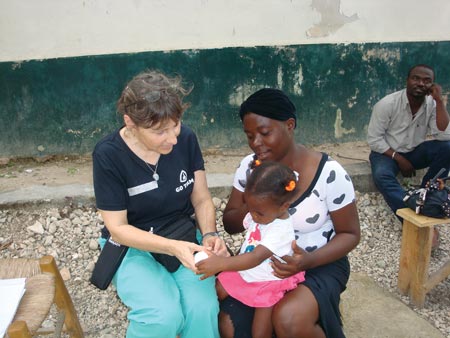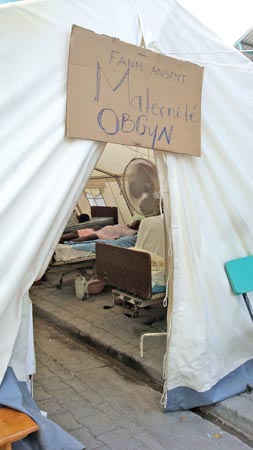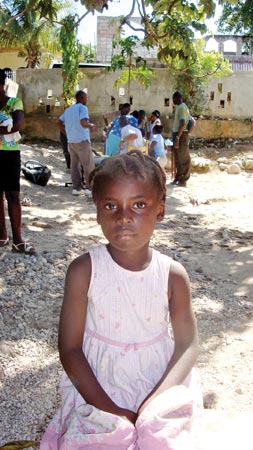
On Jan. 13, 2010, Haiti experienced a 7.0 magnitude earthquake. The earthquake caused extreme devastation, hampering communication and relief efforts. A handful of Johns Hopkins nurses have made it their priority mission to help relieve Haiti.
Some have served in Haiti with the Johns Hopkins Go Team, a multi-disciplinary, stand-ready reserve of Johns Hopkins employees that can respond quickly to major catastrophes anywhere in the United States.
Assistant professor Elizabeth “Beth” Sloand, PhD, CRNP, has coordinated two more teams of Hopkins nurses to travel to grief-stricken Haiti with International Medical Corps (IMC). On March 5 and 12 IMC teams that included School of Nursing faculty members, graduate students, and alumni left for Haiti to provide medical care.
Read the blogs the nurses are keeping while in Haiti at www.nursing.jhu.edu/blogs/blogs/bsloand, www.nursing.jhu.edu/blogs/blogs/haiti and www.hopkins-in-haiti.blogspot.com.
Who’s been to Haiti?
Go Team
January 27 – February 10, Port-au-Prince
Marvin “Rocky” Cagle, RN (JHH)
Alicia Hernandez, RN (JHH)
Elizabeth Sloand, NP (JHU, faculty)

Go Team
January 26 – February 16, USNS Comfort
Meri Clare, RN (JHH)
Go Team
February 14 – February 25, USNS Comfort
Kathleen Feroli, NP (JHU)
Anthony Pho, RN, accel. ’08 (JHH and JHU, alum)
Sue Verrillo, MS ’03, RN (JHH and JHU, alum)
International Medical Corps
March 5 – March 21
Joyce Vazzano, MS, RN, CRNP (JHU, faculty)
Phyllis Mason, MS, RN, CANP (JHU, faculty)
Jennifer Stagl, RN (JHU, MSN student)
Rachel Klimmek, RN ’07 (JHU, alum and MSN student)
Tom Bernadzikowski, MS ’08, RN (JHU alum)
Michelle Felix, MSN ’95, RN ’93, CRNP (JHH and JHU, alum)
International Medical Corps
March 12 – March 28
Kathleen Becker, ANP (JHU, faculty)
Karen Gibbs, RN (JHU, MSN student)
Kristi Thane, RN, accel. ’07 (JHU, alum and MSN student)
The Waiting Game
Beth Sloand, Wednesday, January 20
As of Monday morning, members of the first group, Hopkins Go Team 1, have been briefed, vaccinated, and we are ready to go.
The Go Team leaders and administration are working around the clock to secure the logistics of the team. One top priority of any good relief team is to be sure that we are part of the solution and not add to the problem—of more mouths to feed and water, more needed shelter, more congestion in the already-overburdened country.
So we wait.
First day at Port-au-Prince University Hospital
Beth Sloand, Friday, January 29
We just finished our first day at the University Hospital. I spent a challenging day in the pediatric wards.
There are many children who needed care, but few people to deliver it. The supplies were difficult to come by; things were very confusing—with Swiss physicians, Haitian doctors and nurses, and us with our translators. The challenge is huge, with coordination, communication with various languages, cultural differences, etc.
One sad thing—there was a nursing school on the grounds of the University Hospital here. It collapsed. The bodies of many nursing students are still there—somewhere between 70 and 140. The bodies are entombed there. As a nurse educator, I am still struck every time I walk past that building. So very sad. Can’t get used to it.

First Day Realities in Haiti
Alicia Hernandez, Saturday, January 30
So much of this care involves deciding who to let die. The hard part means watching them die and watching their loved ones deal with their deaths.
Each death was different, each patient was different; from gunshot wounds from a riot, to [patients with] chronic illnesses sent from other hospitals, to Jane Does with no family, no identity, and who still hung on for hours with nothing left we could do. There is so much need, and so many people who want to provide, and so many obstacles.
And this is just our Day One. We will make a difference. I am determined. I don’t know how. I know even less so now than I thought I did three days ago. But with the good will and determination I sensed today, it will happen, no matter how slowly.
“Heartbreaking to see…”
Rocky Cagle, Tuesday, February 2
Today was another day in Haiti—hot. The Johns Hopkins crew is pretty much running the ER now with good outcomes.
We saw 470 patients today; others walked away. We see cases from tuber-culosis, malaria, typhoid, tetanus, gunshot wounds, motor vehicle accidents, CHF, etc. We are good at diagnosing these cases but there is a problem with medications; they are hard to come by.
We could save most of these patients with good facilities and meds. It’s heartbreaking to see people that we know are going to die without treatment that we can’t perform. Ten more days to make a difference in these peoples’ lives. If I only make one difference in one life, it will be worth this effort.
Home from Haiti, haunted by images
Beth Sloand, Saturday, February 13
At the end of a visit, you leave Haiti. But Haiti doesn’t leave you. It has a way of clinging to your heart, never far away. This truth is even deeper in 2010, post-earthquake Haiti. Haiti haunts; it does not leave you alone. Memories are vivid: bandaged limbs of all sizes, odd surgical repairs, thick dust in the air as crews of Haitians sweep trash and shovel rubble, flies swarming wounds and IV bags in hospital wards that are open tents, patients limping from tent to latrine—holding tubing and bags of fluids, and more.
It was a great privilege to be in Haiti among so many relief workers from around the globe. We most certainly made a contribution. My translator Denise said, “Thank you for coming. Without you, many more people would have suffered and many more would have died. We are sorry that we have nothing to give you; we can only thank you. God will thank you.”
What’s Next?
Beth Sloand, Thursday, February 25
The school has been involved in Haiti for over ten years, and we have had 90-100 faculty and students visit in that time to participate in nursing education clinical experiences, clinical practice, and research. Now, post earthquake, we will continue our Haiti-related work with renewed energy in three major ways:
Awareness. We must keep the health and nursing needs of the Haitian population in the public eye. We are planning a panel discussion with Hopkins nurses who have been to Haiti for relief work. We are continuing the Hearts for Haiti campaign and keeping our Haiti web page up-to-date.
Fundraising. Funds raised by students, faculty, and staff will specifically benefit the two organizations that we have historically strong ties to: the Haitian Health Foundation and Haiti Nursing Foundation. To date, we have raised nearly $3,000, and we have several other events planned throughout March and April.
On-the-ground work. Faculty and students will continue to work in the Jérémie area, through our undergraduate PHN course and with graduate student and faculty participation in yearly multidisciplinary medical teams. Additionally, we will support the ongoing relief efforts in Port-au-Prince as opportunities arise.